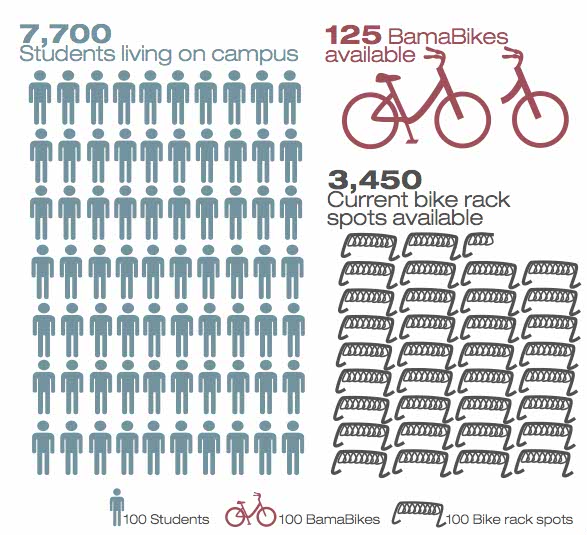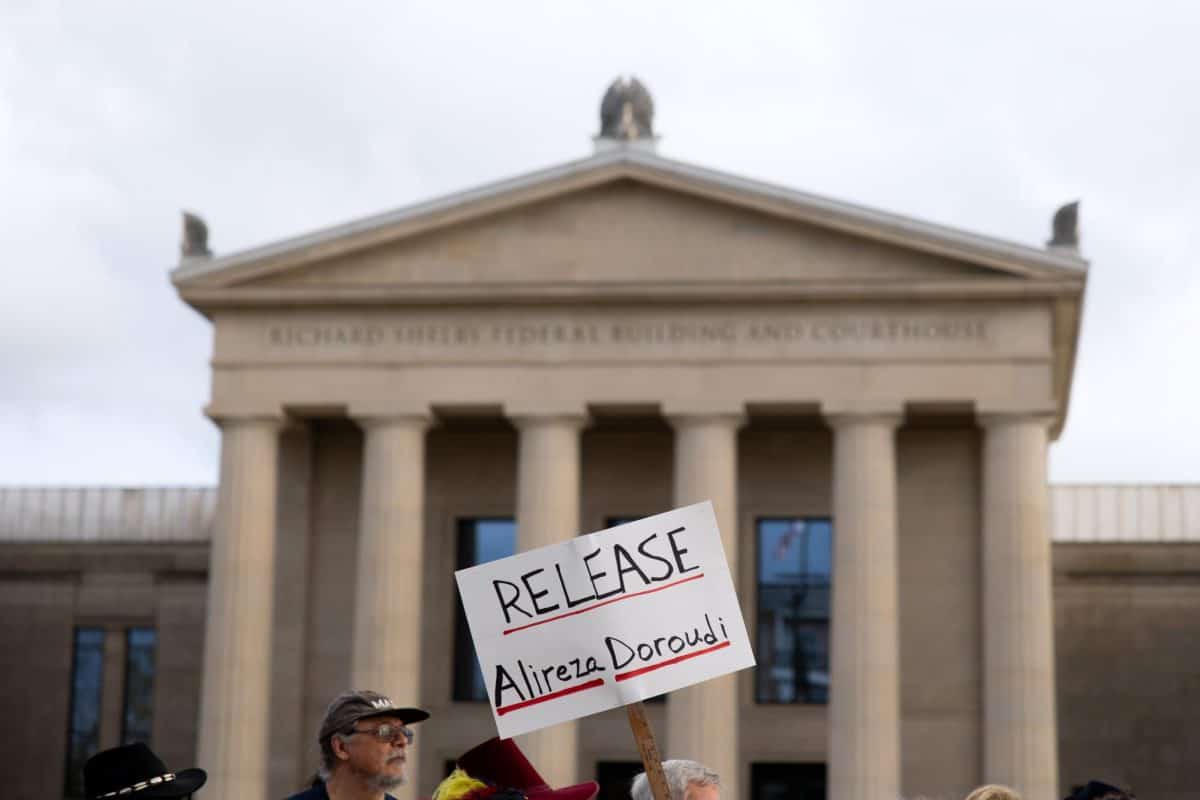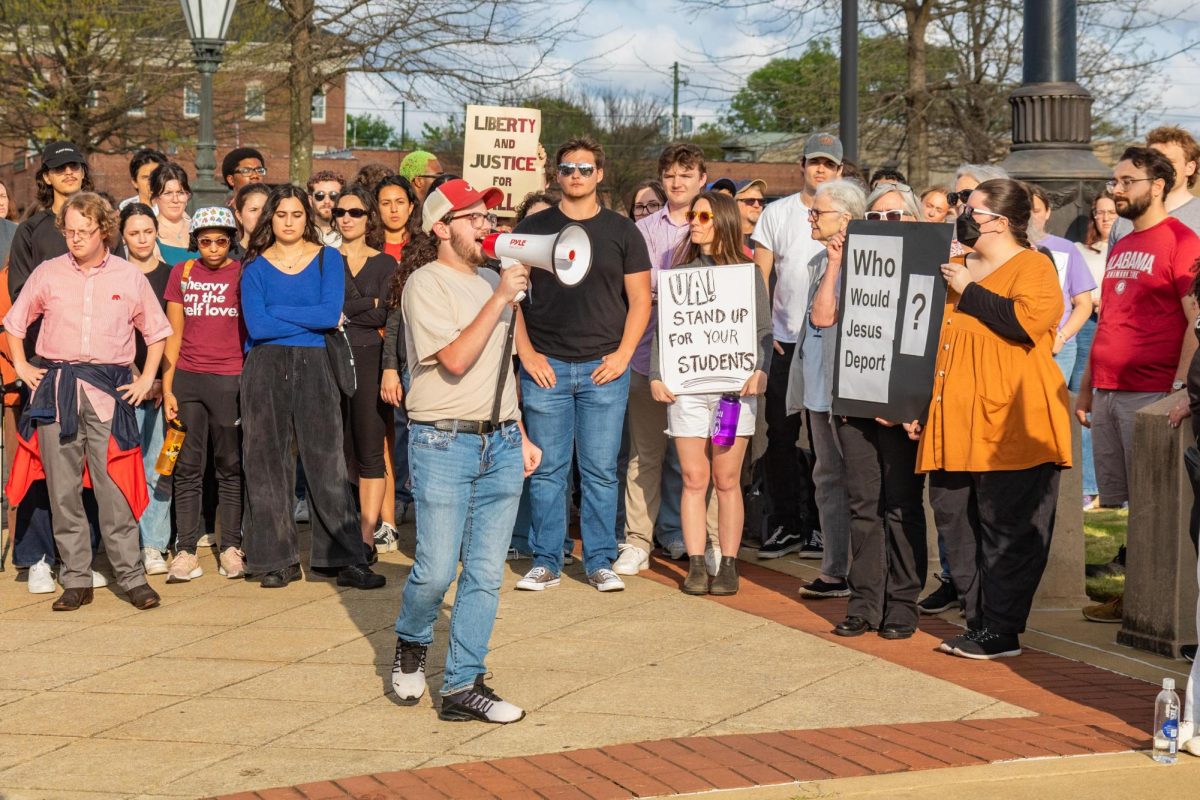By Alyx Chandler and Mark Hammontree | CW Staff
With nearly 33,500 undergraduate and graduate students enrolled at The University of Alabama and almost 7,700 living on campus, many students are beginning to call for a revitalization of the University’s bicycle policies and systems.
There are currently 345 bike racks installed on campus, accommodating only 3,450 bikes, or about one-tenth of the University’s total enrollment.
Many students have turned to bikes to save on gas costs, keep from buying parking permits or do their part for the environment. Because of the increase, many of the bike racks on campus remain almost constantly full. As a result, some students lock their bikes on the nearest available space.
“We have made a lot of progress, but we are still seeing a large number of bikes that are chained or locked to other objects such as handrails, trash cans, light poles, benches and bollards,” Stuart Glaeser, manager of UA Parking Services, said.
Bikes chained to any of these objects are subject to be impounded, as outlined in the UA Bike Policy.
In an effort to address the lack of bike racks on campus, as well as allow students who do not have an opportunity to access them for campus use, the Student Government Association and the UA Transportation Services Office are proposing a student bike-share program.
Brielle Appelbaum, a junior majoring in communication studies and member of the SGA, is spearheading the project.
“It’s important that, like our student body, we grow and expand accordingly,” Appelbaum said.
The program, which is being modeled after Texas A&M’s MaroonBikes program, would give students on campus the opportunity to pay a small fee to rent a bike from a public bike rack for a day.
Appelbaum said she hopes the University can have a beta version of a bike-share program running by fall 2014.
The MaroonBikes program at Texas A&M consists of bike stations operated by an outside company where students receive a key to unlock a bike to use for the remainder of the day for only a few dollars. If the bike is kept for more than 24 hours without returning both the bike and key, a larger fee is charged.
Although the details are not set in stone for how the University’s program would operate, Appelbaum said the SGA is seeking support and interest from the student body in order to ensure the program comes to campus.
While Texas A&M’s program has shown success, similar bike-share programs have not faired as well at other universities. Georgia Tech’s program, ViaCycle, was scrapped after two years of operation because it was not financially sustainable, said Johann Weber, a fourth-year Ph.D. student and chair of the Bicycle Infrastructure Improvement Committee at Georgia Tech.
Despite the financial woes of the program, Weber said ViaCycle boosted awareness and interest in bicycling. Weber said the interest in the program has grown and the city of Atlanta is now pursuing its own citywide bike program, and the campus should have another one by the end of the year.
Appelbaum said she would like to see the city of Tuscaloosa ultimately adopt a similar attitude if the proposed UA program generates positive interest.
“A bike-share program will help not only local commuters get around campus, but assist in building close ties with the Tuscaloosa community,” Appelbaum said.
The funding for the University’s program would eventually be self-sustaining, Appelbaum said. The SGA and Transportation Services team are considering payment by debiting ACT cards, and the fees that students pay for the bikes will then be circulated back into the program in order to sustain it. Appelbaum said the ultimate decision on such a policy would be made further along in the process by Student Services, the Action Card Office and the University.
In addition to helping alleviate the congestion in bike racks on campus, the program would also allow students who cannot afford bikes or cannot transport their bikes to campus an opportunity to still use bikes to get to class.
“Bikes are expensive to purchase, can be difficult to store, and it is a challenge transporting a bike to campus if students live off campus,” Anna Turkett, president of the University’s Environmental Council, said. “A bike-share program could increase the availability of bikes to everyone on campus and improve the campus attitude towards bikes.”
The only other bike rental program in operation at the University is the Outdoor Recreation Center’s BamaBikes program, which has 125 bikes for students to rent for $5 a month. Some of the program’s renters this past fall said the wait list for a bike can range up to 30 students to more than 100 students.
Appelbaum said the University has the opportunity to be a leader if the bike-share program comes to fruition.
“The University of Alabama has been on the forefront of innovation, sustainability and growth over the past four years,” Appelbaum said.
Before the bike-share racks begin showing up on campus, however, the plans for the program must first be finalized, and the decision must be approved by the University.
Until then, students with bikes will have to make do with what they have.









